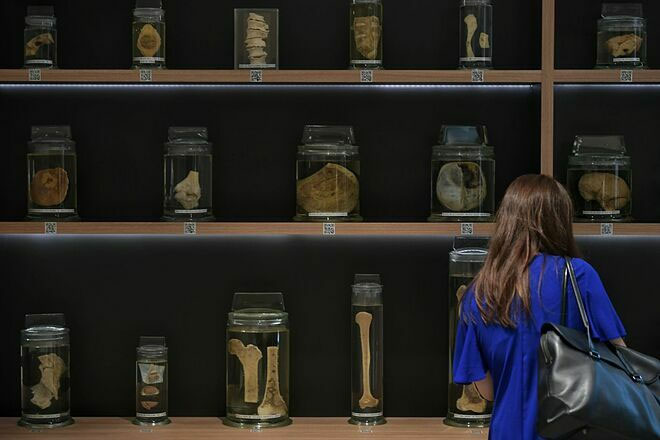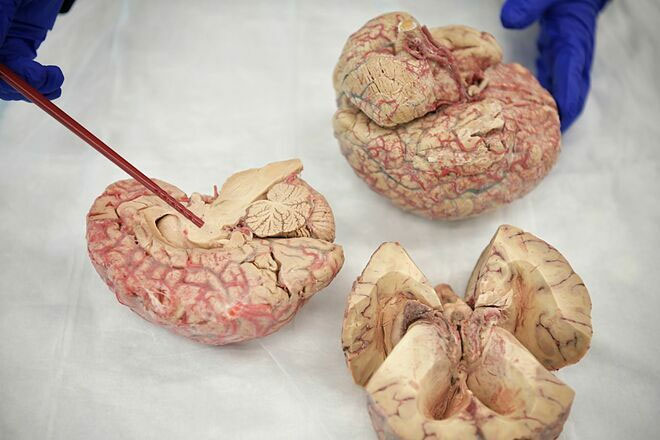Southeast Asia's first brain bank was born
The brain bank facilitates research into neurological disorders and improves treatments for Asians.
The Singapore Brain Bank stems from the ideas of scientists from Nanyang Technological University (NTU), Lee Kong Chian School of Medicine (LKCMedicine), National Health Group (NHG) and National Institute of Neuroscience gia (NNI).

Human brain specimens stored at the Center for Anatomical Resources, Lee Kong Chian School of Medicine.(Photo: Straits Times).
The facility, worth US $ 500,000, was created to store brain and spinal cord research from deceased donors.It is also the first brain bank in Southeast Asia.
Aiming to attract 1,000 brain donors within the next four years, Singapore Brain Bank receives donations from both healthy people and patients with degenerative and neurological disorders.
Scientists said that Singapore brain bank is extremely necessary, in the context of rapidly aging population. ¼ people of this country will turn 65 in 2030, life expectancy is expected to increase to 84.8.
Philip Choo, Executive Director of the National Health Group (NHG) emphasizes the urgency of studies related to stroke, Parkinson's and dementia (Alzheimer's).
Neurological disorders like Alzheimer's and Parkinson's have different effects on the brains of Asians and whites. In the past, research was often done on animal tissue or scan results from people's brains from other continents. However, with existing technology, brain scans cannot reach the molecular level. Therefore, buildings developed in the West cannot be directly applied to Singaporeans.
The brain bank allows scientists to analyze Asian brain tissue and improve treatments for common diseases.

The brain bank allows scientists to analyze Asian brain tissue.(Photo: Straits Times).
Professor Richard Reynold said that in order for families to be buried in a timely manner, the bank will perform the surgery within 24 hours of the death of the donor. The brain tissue is then frozen in an environment of -80 degrees Celsius, helping preserve for decades.
The identity of the donor is strictly confidential, stored in an independent computer, accessible only to the Director and the President of the bank. At the same time, the process of using the brain for research must be rigorously ethically and scientifically reviewed.
Survey results show that Singaporeans have a positive attitude before the launch of the bank. 50% of respondents said they are willing to participate in donation.
Last week, Lovely Fernandez, 41, registered her brain donation, despite family fears.
In an interview on November 27, she said: "I was diagnosed with multiple sclerosis, an incurable disease that left my body paralyzed for the past 10 years. Hopefully in the form of donation, I can help scientists find a cure for others. "
There are already three people registered to donate.
- Discover Britain's largest brain bank
- The process of turning human brain into immortality in America
- Floods, droughts will attack Southeast Asia more rapidly
- The species 'beasts' Southeast Asia is as small as a button
- Making dog's DNA bank
- The baby was born with a part of the brain outside the skull saved
- Scientists have discovered 97 regions in the brain that have never been known before
- How was the first bank thief in US history arrested?
- Future sperm bank on the Moon
- Babies born at midnight are at risk for brain problems
- The first two sheep were born in Palestine
- Father of ATM?
 Norway built the world's tallest wooden tower
Norway built the world's tallest wooden tower Kremlin
Kremlin Ashurbanipal: The oldest royal library in the world
Ashurbanipal: The oldest royal library in the world Decoding the thousand-year construction of Qin Shihuang shocked the world
Decoding the thousand-year construction of Qin Shihuang shocked the world